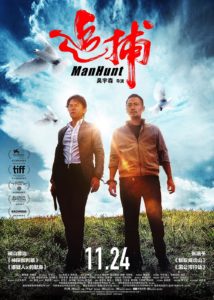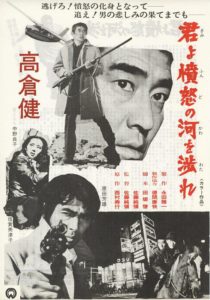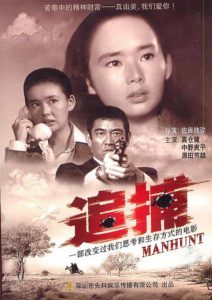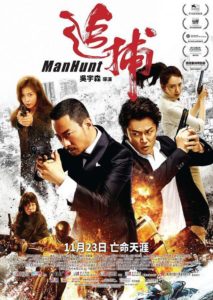ManHunt
追捕
Hong Kong/China, 2017, colour/b&w, 2.35:1, 108 mins.
Director: Wu Yusen 吴宇森 [John Woo].
Rating: 5/10.
Tired return to his bang-bang style is a big let-down from Hong Kong veteran Wu Yusen [John Woo].
Osaka, Japan, the present day. Celebrity Chinese lawyer Du Qiu (Zhang Hanyu), who is soon to be transferred from Japan to the US, walks into a sidestreet bar for a late-night drink and gets talking to the two women running it (Wu Feixia, Ha Ji-weon). A group of gangsters comes in and Du Jie offers to help defend the women; instead, they suggest he just leaves. As soon as he’s gone, the two women massacre the gangsters. Some time later Du Qiu attends the lavish 60th anniversary party of Tenjin Pharmaceuticals, which he’s successfully defended numerous times. Tenjin chairman Sakai Yoshihiro (Kunimura Jun) announces his son, Sakai Hiroshi (Ikeuchi Hiroyuki), will be in charge of new product development. Du Qiu  meets a half-Chinese woman, Tonami Mayumi (Qi Wei), who says she’d like to talk to him; after driving him home, they agree to meet the next day at Osaka railway station. Meanwhile, inside Du Qiu’s flat a woman (Tao) is waiting for him, sent by Sakai Yoshihiro to seduce him into staying in Japan. Next morning, Du Qiu wakes up to find the woman dead in bed next to him. After being arrested by the police, led by corrupt cop Ito Mamoru (Takenaga Naoto), Du Jie escapes; he’s later cornered by detective Yamura Satoshi (Fukuyama Masaharu) and his sidekick Hyakuta Rika (Sakuraba Nanami) but escapes them too, hiding out with some homeless people in a shanty town led by Sakaguchi Hideo (Kurata Yasuaki) from which Tenjin recruits people for testing its new drugs. Meanwhile, from CCTV footage of the party, Yamura Satoshi has recognised Tonami Mayumi as being involved in a case Du Jie successfully defended Tenjin against three years ago and which resulted in her fiance’s suicide. Next day Du Jie calls Sakai Yoshihiro and suggests they meet at a riverside coffee shop; instead, he finds himself almost shot by the two female assassins from the sidestreet bar. Fleeing by speedboat, he’s pursued by Yamura Satoshi, who thinks Du Jie is innocent and tries to get him to give himself up. Du Jie escapes and meets Tonami Mayumi at the railway station as planned. She takes him to a remote spot in the countryside to explain her interest in him. But the two assassins, and Yamura Satoshi and Hyakuta Rika, are not far behind.
meets a half-Chinese woman, Tonami Mayumi (Qi Wei), who says she’d like to talk to him; after driving him home, they agree to meet the next day at Osaka railway station. Meanwhile, inside Du Qiu’s flat a woman (Tao) is waiting for him, sent by Sakai Yoshihiro to seduce him into staying in Japan. Next morning, Du Qiu wakes up to find the woman dead in bed next to him. After being arrested by the police, led by corrupt cop Ito Mamoru (Takenaga Naoto), Du Jie escapes; he’s later cornered by detective Yamura Satoshi (Fukuyama Masaharu) and his sidekick Hyakuta Rika (Sakuraba Nanami) but escapes them too, hiding out with some homeless people in a shanty town led by Sakaguchi Hideo (Kurata Yasuaki) from which Tenjin recruits people for testing its new drugs. Meanwhile, from CCTV footage of the party, Yamura Satoshi has recognised Tonami Mayumi as being involved in a case Du Jie successfully defended Tenjin against three years ago and which resulted in her fiance’s suicide. Next day Du Jie calls Sakai Yoshihiro and suggests they meet at a riverside coffee shop; instead, he finds himself almost shot by the two female assassins from the sidestreet bar. Fleeing by speedboat, he’s pursued by Yamura Satoshi, who thinks Du Jie is innocent and tries to get him to give himself up. Du Jie escapes and meets Tonami Mayumi at the railway station as planned. She takes him to a remote spot in the countryside to explain her interest in him. But the two assassins, and Yamura Satoshi and Hyakuta Rika, are not far behind.
REVIEW
After the debacle of his two-part Civil War extravaganza The Crossing 太平轮 (2014-15), Hong Kong veteran Wu Yusen 吴宇森 [John Woo] goes back to his trademark bang-bang style in the the Japan-set ManHunt 追捕 – but with seriously mixed results. Despite glossy production values, this innocent-on-the-run crime drama has a tired feel, with Wu often pastiching himself (plenty of white doves) and the action rarely delivering much oomph between the rote dialogue. In the Mainland, the Hong Kong/China co-production scraped only a blah RMB106 million and vanished in just over two weeks.
 The film is based on the 1975 Japanese novel 君よ憤怒の河を渉れ (literally, “You Must Cross the River of Wrath”) by Nishimura Juko 西村寿行 that was adapted into a 1976 film of the same title starring the late, great Takakura Ken 高仓健 and directed by crime-film journeyman Sato Junya 佐藤纯弥 (see poster, left). The first foreign film shown in the Mainland after the Cultural Revolution – in 1978, as Manhunt 追捕 (see poster, below left) – it gained iconic status and cemented Takakura’s reputation there. Wu sees his ManHunt as a personal tribute to the actor, on whom he reportedly based the character played by Zhou Runfa 周润发 [Chow Yun-fat] in A Better Tomorrow 英雄本色 (1986). That’s as maybe, but what’s ended up on screen bears almost no connection with the 1976 Japanese film, either in plot (the only similarity is that it centres on a police chase
The film is based on the 1975 Japanese novel 君よ憤怒の河を渉れ (literally, “You Must Cross the River of Wrath”) by Nishimura Juko 西村寿行 that was adapted into a 1976 film of the same title starring the late, great Takakura Ken 高仓健 and directed by crime-film journeyman Sato Junya 佐藤纯弥 (see poster, left). The first foreign film shown in the Mainland after the Cultural Revolution – in 1978, as Manhunt 追捕 (see poster, below left) – it gained iconic status and cemented Takakura’s reputation there. Wu sees his ManHunt as a personal tribute to the actor, on whom he reportedly based the character played by Zhou Runfa 周润发 [Chow Yun-fat] in A Better Tomorrow 英雄本色 (1986). That’s as maybe, but what’s ended up on screen bears almost no connection with the 1976 Japanese film, either in plot (the only similarity is that it centres on a police chase  for an innocent man) or in overall feel.
for an innocent man) or in overall feel.
Instead, ManHunt‘s point of reference is more 1970s/1980s Hong Kong action quickies – but relocated to Japan and given modern production values by Japanese key crew. The sharp, cool photography is by Ishizaka Takuro 石坂拓郎, who shot the Rurouni Kenshin るろうに剣心 swordplay trilogy (2012-14), the hit-and-miss score is by Iwashiro Taro 岩代太郎, who also scored Wu’s Red Cliff 赤壁 (2008-09) and The Crossing, and the steely clean production design is by Taneda Yohei 种田阳平 (Warriors of the Rainbow 赛德克•巴莱, 2011; The Flowers of War 金陵十三钗, 2011). The result is a film that unmistakably looks like a modern Japanese production but whose content equally unmistakably harks back to Hong Kong 30 or more years ago.
As such, it’s basically action all the way, with deadly female assassins, helmeted killers on motorcycles, mad scientists in a laboratory, and a Big Evil Pharma as the backstory; with chases in the metro, through the streets and by river speedboats; with a mixture of guns, more guns, machine guns (and sometimes samurai swords); and with everyone missing the good guys at point-blank range. Never mind the name Wu Yusen on the credits, this is more like Angel Enforcers 皇家飞凤 (1989) or its ilk.
It’s all passably entertaining on a trashy level – including an opening sequence which is only there to introduce the two female assassins and get Wu fanboys worked up – but with production values and a cast like this the audience is justified in expecting more. In the main role as the innocent fugitive, Mainland tough-guy Zhang Hanyu 张涵予 looks cool in shades but is totally unbelievable as a corporate lawyer and establishes no screen chemistry with anyone; Japanese singer/TV actor Fukuyama Masaharu 福山雅治 is equally miscast as a dogged cop, with an annoyingly eager-beaver female sidekick (cute Sakuraba Nanami 桜庭ななみ) who dotes over him; and veteran Kunimura Jun 国村隼 punches the clock as a corrupt pharma chairman. As the female assassins, Wu Feixia 吴飞霞 [Angeles Woo, daughter of] and South Korea’s Ha Ji-weon 하지원 | 河智苑 just scrape by, with no special menace, and Mainland actress/singer Qi Wei 戚薇 is just OK as the initially mysterious female lead. Despite all the gunplay, it’s just that, with no sense of Wu’s trademark heroic bloodshed or bullet ballets.
Despite seven scriptwriters who include Hong Kong commercial veterans Chen Qingjia 陈庆嘉 [Chan Hing-kai], Chen Jiashang 陈嘉上 [Gordon Chan] (who also produces) and Ruan Shisheng 阮世生 [James Yuen], the dialogue is strictly functional and the action situations generic. Coming out best from it all is the city of Osaka, which looks clean and imposing throughout.
CREDITS
Presented by China Film Media Asia Audio Video Distribution (CN), Media Asia Film Production (HK). Produced by Media Asia Film Production (HK).
Script: Nie Hongfeng [Chen Qingjia/Chan Hing-kai], Chen Jiashang [Gordon Chan], Ruan Shisheng [James Yuen], Era Itaru, Gu Zailin, Wang Simin, Ye Peijie. Novel: Nishimura Juko. Photography: Ishizaka Takuro. Editing: Huang Hai, Li Jiahua. Music: Iwashiro Taro. Production design: Taneda Yohei. Art direction: Iizuka Yuko, Kojima Shinsuke, Dong Zhiliang. Costume design: Ogawa Kumiko. Sound: Du Duzhi, Wu Shuyao. Action: Sonomura Kensuke, Kawamoto Koji. Car/bike stunts: Amamiya Masanobu, Noro Shinji, Sato Hidemi. Special effects: Sekiyama Kazuaki. Visual effects: Lin Hongfeng, Xu Debiao, Lin Junyu (Free-D Workshop). Second-unit direction: Liang Baijian [Patrick Leung].
Cast: Zhang Hanyu (Du Qiu), Fukuyama Masaharu (Yamura Satoshi, police detective), Qi Wei (Tonami Mayumi), Ha Ji-weon (Rain, assassin), Wu Feixia [Angeles Woo] (Dawn, assassin), Sakuraba Nanami (Hyakuta Rika, Yamura Satoshi’s sidekick), Ikeuchi Hiroyuki (Sakai Hiroshi, Tenjin chairman’s son), Tao [Okamoto Tao] (Tanaka Kiko, murdered woman), Tokunaga Kuniharu (Asano Yuji), Yajima Kenichi (Doto Yasutake), Tanaka Kei (Kitagawa Masaki), Joe Nakamura (Aoki Syusuke), Yoshizawa Hisashi (kidnapper), Takenaga Naoto (Ito Mamoru, corrupt police detective), Kurata Yasuaki (Sakaguchi Hideo, shanty-town leader), Saito Takumi (kidnapper), Kunimura Jun (Sakai Yoshihiro, Tenjin chairman), Matsuura Tateki (gang boss in bar), Nii Noriko (room maid), Yashiki Hiroko (Sakai Yoshihiro’s female bodyguard).
Premiere: Venice Film Festival (Out of Competition – Fiction), 8 Sep 2017.
Release: Hong Kong, 23 Nov 2017; China, 24 Nov 2017.
